Is your canine companion constantly licking their lips? This common behavior, where a dog repeatedly moistens their nose and mouth with their tongue, can be puzzling for pet owners. At WHY.EDU.VN, we provide expert insights into this behavior and more, exploring potential underlying causes ranging from harmless habits to significant health concerns, and we offer clear guidance on when to seek veterinary attention. Uncover the possible reasons behind this dog behavior, including oral discomfort, nausea, or anxiety, and gain practical advice for helping your furry friend with resources from trusted sites like the American Kennel Club, enabling you to provide the best care.
1. Normal Lip Licking in Dogs: When is it Okay?
Just like humans, dogs engage in some amount of normal lip licking throughout the day. This is typically nothing to worry about and can be attributed to simple factors:
- Hunger: The anticipation of a meal can trigger increased salivation and lip licking.
- Appetizing Smells: The aroma of food can stimulate your dog’s senses and cause them to lick their lips in anticipation.
- Excitement: General excitement, such as during playtime or when greeting their owner, can sometimes lead to lip licking.
2. Abnormal Lip Licking: Recognizing the Signs
When lip licking becomes excessive or is accompanied by other concerning symptoms, it may indicate an underlying issue. Be on the lookout for these signs:
- Difficulty Chewing: Problems with chewing, such as dropping food or favoring one side of the mouth, could signal oral pain.
- Excessive Drooling: Increased saliva production beyond the norm might point to nausea or dental issues.
- Decreased Appetite or Water Intake: A sudden loss of interest in food or water could be a sign of illness or discomfort.
- Pawing at the Mouth: If your dog frequently paws at their mouth or face, it may indicate oral pain or a foreign object.
- Sensitivity Around the Head or Mouth: Reacting negatively to touch around the head or mouth can be a sign of pain or discomfort.
- Abnormal Swallowing: Gulping or swallowing excessively can be indicative of nausea or a throat problem.
- Gagging or Vomiting: These symptoms are often associated with nausea or gastrointestinal issues.
- Stress Indicators: Panting, pacing, whining, or other signs of stress can sometimes manifest as excessive lip licking.
3. Dental Disease: A Major Culprit
Dental disease is one of the most common reasons for excessive lip licking in dogs. According to the American Veterinary Dental College, periodontal disease affects a significant percentage of dogs, leading to discomfort and pain.
3.1. The Progression of Dental Disease
Without regular dental care, plaque and tartar can accumulate on your dog’s teeth, leading to inflammation of the gums (gingivitis) and eventually periodontitis, which involves damage to the tissues and bone supporting the teeth.
3.2. Recognizing Dental Disease
Look for these signs of dental disease in addition to lip licking:
- Bad Breath: A foul odor emanating from your dog’s mouth is a telltale sign of bacterial buildup.
- Excessive Drooling: Inflammation and infection in the mouth can increase saliva production.
- Eating Difficulties: Your dog may show reluctance to eat, drop food, or wince when chewing due to oral pain.
- Facial Rubbing: They may rub their face against furniture or paw at their mouth in an attempt to relieve discomfort.
- Tooth Loss: Advanced dental disease can lead to loose or missing teeth.
- Sneezing: Inflammation from advanced dental disease can affect the nasal passages, leading to sneezing.
- Swelling Under the Eye: A tooth abscess can cause swelling in the area below the eye.
3.3. Examining Your Dog’s Mouth
If you suspect dental disease, carefully examine your dog’s mouth, but always prioritize safety. If your dog is in pain or nervous, consult your veterinarian instead of attempting a potentially stressful examination. Check for:
- Broken or Missing Teeth: Obvious signs of dental trauma or advanced disease.
- Red, Swollen, or Bleeding Gums: Inflammation is a key indicator of gingivitis or periodontitis.
- Plaque and Tartar: Yellow, brown, or black deposits on the teeth.
- Foreign Objects: Although less common, look for anything lodged between the teeth.
3.4. Seeking Veterinary Care
If you observe any of these signs, consult your veterinarian. A professional dental cleaning under anesthesia is often necessary to remove plaque and tartar, assess the extent of the disease, and extract any damaged teeth. Addressing dental disease is crucial not only for relieving pain but also for preventing potential complications such as heart, liver, or kidney disease.
4. Foreign Objects in the Mouth: An Irritating Problem
Sometimes, excessive lip licking can be caused by a foreign object lodged in your dog’s mouth. Sticks, foxtails, or grass awns can become trapped between the teeth or gums, causing irritation and discomfort.
4.1. Symptoms of a Foreign Object
The symptoms of a foreign object in the mouth can mimic those of dental disease, including:
- Excessive Lip Licking
- Drooling
- Oral Pain
- Head Shaking
- Bad Breath
4.2. Checking for Foreign Objects
Carefully inspect your dog’s mouth for any visible foreign objects. However, be aware that some objects may be lodged deep in the mouth or far back in the throat, making them difficult to see.
4.3. Veterinary Intervention
If you suspect a foreign object but cannot locate it, consult your veterinarian. They may need to perform a sedated oral exam to thoroughly inspect the mouth and remove any lodged objects.
5. Nausea: An Underlying Cause
Excessive lip licking and drooling can also be signs of nausea in dogs. Nausea can result from various issues, ranging from dietary indiscretion to systemic diseases.
5.1. Digestive Tract Issues
One of the most common causes of nausea in dogs is eating something they shouldn’t have. This can lead to:
- Mild Nausea: May resolve with a bland diet and probiotics.
- Pancreatitis: Ingestion of fatty foods can trigger pancreatitis, a serious condition characterized by vomiting and abdominal pain.
- Foreign Body Ingestion: Swallowing a foreign object can cause an obstruction in the digestive tract, leading to nausea and other symptoms.
- Acid Reflux: Similar to humans, dogs can experience acid reflux, which can cause discomfort and lip licking.
5.2. Non-Gastrointestinal Issues
Nausea can also be a symptom of other underlying conditions, such as:
- Kidney Failure: The buildup of toxins in the blood can cause nausea.
- Liver Disease: Liver dysfunction can also lead to nausea.
5.3. Toxin Exposure
Certain toxins can cause nausea, along with other symptoms such as trembling, shaking, and vomiting. Common toxins include:
- Xylitol: An artificial sweetener found in many sugar-free products.
- Chocolate: Contains theobromine, which is toxic to dogs.
5.4. Recognizing Nausea
In addition to lip licking, other signs of nausea in dogs include:
- Drooling
- Vomiting
- Decreased Appetite
- Lethargy
- Eating Grass
5.5. When to Seek Veterinary Care
If your dog is showing signs of nausea, it’s important to consult your veterinarian to determine the underlying cause and receive appropriate treatment. Immediate veterinary attention is warranted if your dog has ingested a known toxin or is showing signs of severe illness.
6. Bloat and GDV: A Life-Threatening Emergency
Bloat, or gastric dilation, occurs when a dog’s stomach becomes distended with air. Gastric dilation and volvulus (GDV) is a more severe condition in which the bloated stomach rotates and twists on itself, cutting off blood supply.
6.1. Risk Factors
GDV is more common in large, deep-chested breeds and dogs that eat quickly.
6.2. Recognizing Bloat and GDV
In addition to excessive lip licking, other signs of bloat and GDV include:
- Restlessness and Pacing
- Distended Abdomen
- Discomfort When Lying Down
- Excessive Panting
- Drooling
- Whining or Other Signs of Pain
- Gagging or Dry Heaving
6.3. Immediate Veterinary Attention
Bloat and GDV are life-threatening emergencies that require immediate veterinary intervention. If you suspect your dog has bloat or GDV, seek veterinary care immediately.
7. Seizures: An Unusual Cause
Seizures can sometimes manifest as unusual behaviors, including excessive lip licking.
7.1. Types of Seizures
- Psychomotor Seizures: Characterized by staring into space or dazed behavior.
- Focal Seizures: Involve localized symptoms such as limb movement, facial twitching, or lip licking.
- Generalized Seizures: Severe seizures that affect multiple areas of the brain, often involving loss of consciousness and violent limb movements.
7.2. Differentiating Seizures from Other Conditions
It can be challenging to distinguish seizures from other conditions such as heart disease or vestibular disease.
7.3. Seeking Veterinary Diagnosis
If you suspect your dog has had a seizure, consult your veterinarian for an examination and diagnostic testing.
8. Allergies: A Common Irritant
Allergies are a common cause of excessive lip licking and other skin-related symptoms in dogs. Allergies can be triggered by food, fleas, or environmental factors.
8.1. Common Symptoms of Allergies
- Red, Irritated Skin
- Excessive Licking, Chewing, or Scratching
- Hair Loss
- Skin Infections
- Ear Infections
8.2. Diagnosing and Treating Allergies
Diagnosing allergies can be a process of trial and error, involving food trials, allergy testing, and skin or ear cytology. Treatment options include allergy medications, specialized diets, and topical treatments.
9. Dehydration: A Simple Explanation
Dehydration can cause dryness and discomfort in the mouth, leading to increased lip licking.
9.1. Recognizing Dehydration
- Dry or Sticky Gums: A key indicator of dehydration.
- Prolonged Capillary Refill Time: The time it takes for color to return to the gums after pressure is applied.
9.2. Addressing Dehydration
Offer your dog fresh water and monitor their condition. If dehydration is severe, veterinary intervention may be necessary to administer fluids.
10. Canine Cognitive Dysfunction: Age-Related Changes
Canine cognitive dysfunction (CCD), similar to Alzheimer’s disease in humans, can cause behavioral changes in older dogs, including excessive lip licking.
10.1. Other Signs of CCD
- Anxiety
- Disorientation
- Changes in Sleep-Wake Cycles
- House Soiling
10.2. Managing CCD
If you suspect your dog has CCD, consult your veterinarian. Treatment options may include medications, supplements, and environmental modifications.
11. Fear and Anxiety: Emotional Triggers
Lip licking can be a calming signal in dogs, indicating they are feeling stressed or anxious.
11.1. Recognizing Fear and Anxiety
- Lowered Head or Body Posture
- Avoidance Behavior
- Trembling or Shaking
- Yawning
- Panting
11.2. Addressing Fear and Anxiety
Identify and remove your dog from the source of their fear or anxiety. Consult your veterinarian or a qualified dog trainer for guidance on managing anxiety.
12. Obsessive-Compulsive Disorder: Repetitive Behaviors
Obsessive-compulsive disorder (OCD) can manifest as repetitive behaviors such as excessive lip licking.
12.1. Other OCD Behaviors
- Pacing
- Licking of Paws or Other Body Parts
- Tail Chasing
12.2. Seeking Veterinary Diagnosis and Treatment
If you suspect your dog has OCD, consult your veterinarian for diagnosis and treatment options, which may include behavioral therapy or medication.
13. Is Lip Licking Normal or Not?
If none of the above conditions seem to fit, your dog’s lip licking may simply be a normal behavior. However, if you have any concerns or notice a sudden increase in frequency, it’s always best to consult your veterinarian.
14. The Importance of Knowing What is Normal for Your Dog
Regularly observing your dog’s behavior and physical condition can help you identify potential problems early on. Consider performing a monthly health scan to familiarize yourself with your dog’s normal state.
15. Expert Advice and Support at WHY.EDU.VN
At WHY.EDU.VN, we understand the challenges of pet ownership and the importance of reliable information. If you’re seeking answers to your questions or need guidance on your pet’s health and well-being, we’re here to help. Our team of experts provides comprehensive resources and support to help you provide the best possible care for your furry friend.
16. Actionable Steps to Take
- Observe: Note when and how often your dog licks their lips.
- Assess: Look for other symptoms like bad breath, drooling, or changes in appetite.
- Consult: If concerned, reach out to your veterinarian for a thorough check-up.
Here is a detailed list of possible causes of increased lip-licking behavior in dogs:
| Cause | Symptoms | Action |
|---|---|---|
| Dental Disease | Bad breath, excessive drooling, difficulty eating, pawing at the mouth, red and swollen gums | Schedule a vet appointment for a dental check-up and cleaning. |
| Foreign Object in Mouth | Excessive drooling, pawing at the mouth, discomfort, head shaking | Check the dog’s mouth for any visible objects; if unable to remove, consult a vet. |
| Nausea | Vomiting, diarrhea, loss of appetite, lethargy | Monitor symptoms; provide a bland diet. If symptoms persist or worsen, consult a vet. |
| Bloat/GDV | Distended abdomen, restlessness, unsuccessful attempts to vomit, excessive panting | Seek immediate veterinary care. |
| Seizures | Twitching, loss of consciousness, convulsions | Consult a vet to determine the cause and treatment. |
| Allergies | Itching, skin redness, hair loss, frequent ear infections | Consult a vet for allergy testing and management options. |
| Dehydration | Dry gums, sunken eyes, decreased skin elasticity | Provide fresh water. If severe, seek veterinary care for fluid administration. |
| Canine Cognitive Dysfunction | Disorientation, changes in sleep patterns, decreased interaction, anxiety | Consult a vet to manage symptoms and improve quality of life. |
| Fear and Anxiety | Panting, trembling, hiding, avoiding contact | Identify and remove the source of anxiety; consider behavioral therapy or medication. |
| Obsessive-Compulsive Disorder | Repetitive behaviors like excessive licking, pacing, or tail chasing | Consult a vet for diagnosis and treatment options like behavioral therapy or medication. |
| Normal Licking Behavior | Occasional licking without other symptoms | Monitor and note triggers. If no other symptoms are present, it is likely normal behavior. |
| Toxin Exposure | Drooling, vomiting, trembling, seizures | Seek immediate veterinary care; contact a poison control center. |
| Acid Reflux | Regurgitation, burping, loss of appetite | Consult a vet for diagnosis and potential medication. |
| Kidney Disease | Increased thirst and urination, loss of appetite, vomiting | Consult a vet for diagnosis and management. |
| Liver Disease | Jaundice, loss of appetite, vomiting | Consult a vet for diagnosis and management. |
| Pain (Other) | Hiding, whimpering, reluctance to move | Consult a vet for pain management and diagnosis. |
| Neurological Issues | Head tilt, incoordination, changes in gait | Consult a vet for a neurological evaluation. |
| Medication Side Effects | Change in behavior, gastrointestinal upset | Discuss with your vet to adjust medication or find alternatives. |
| Heat Stroke | Excessive panting, disorientation, collapse | Seek immediate veterinary care. |
| Hormonal Imbalance | Changes in appetite, coat, or behavior | Consult a vet for diagnosis and management. |
| Tumor or Growth | Localized swelling or pain | Consult a vet for diagnosis and treatment. |
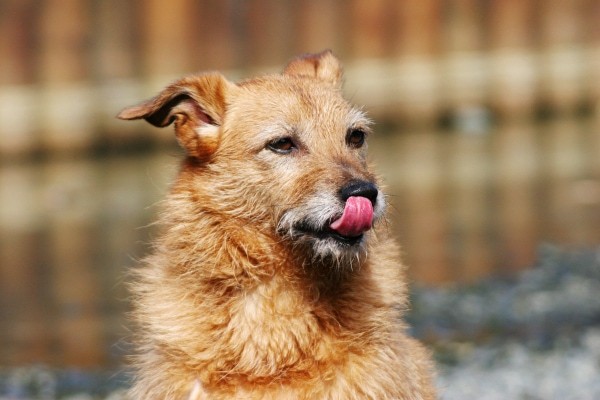
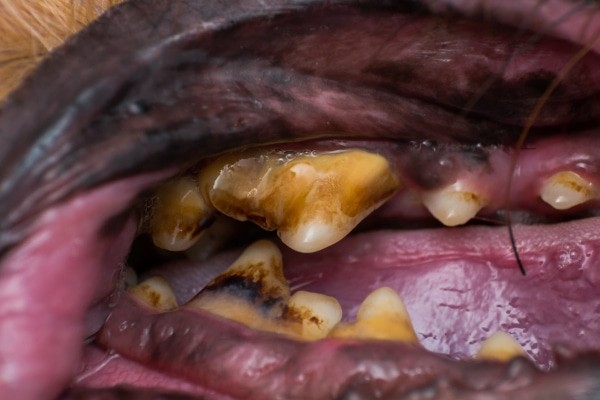
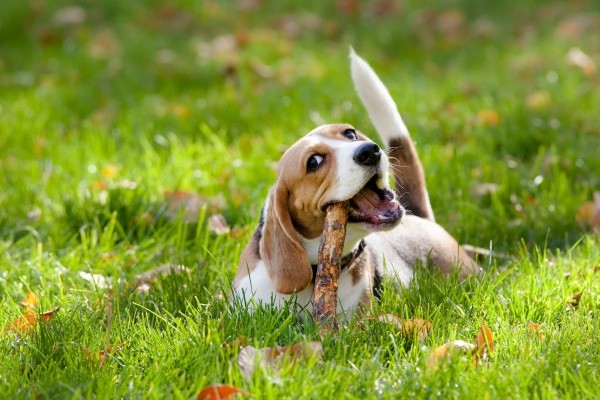
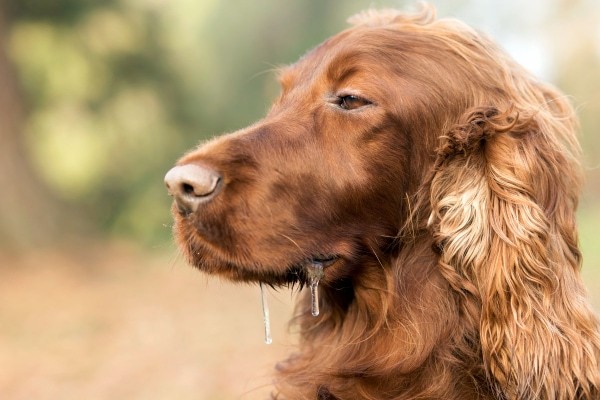
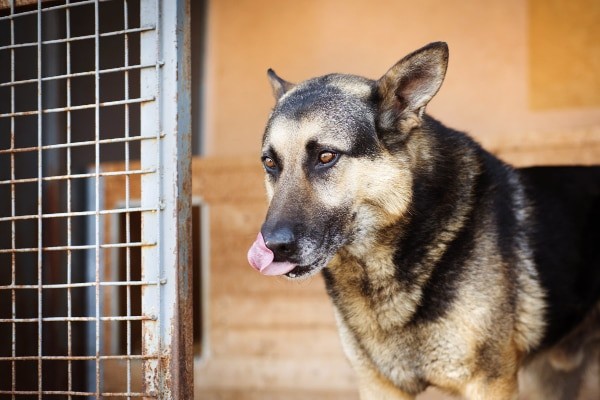
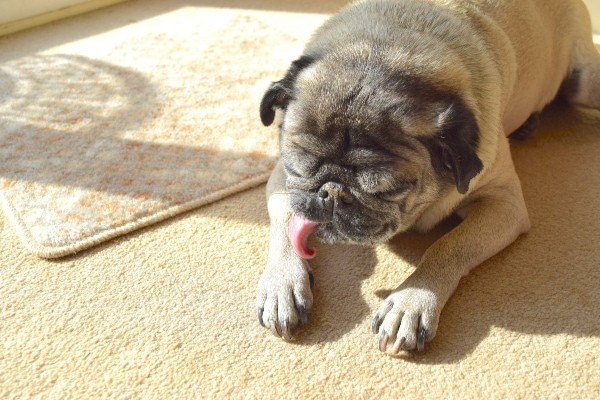
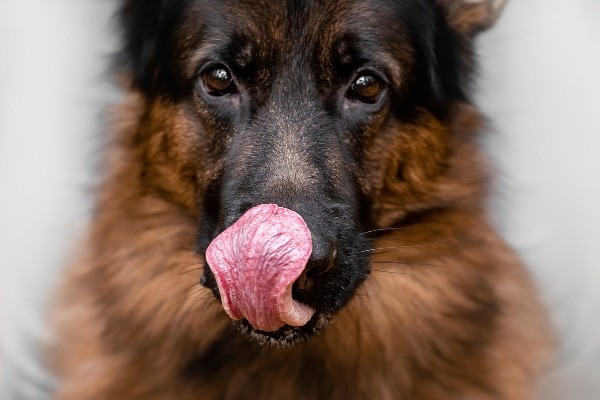

17. FAQs: Addressing Your Concerns
1. Why is my dog licking his lips excessively all of a sudden?
Sudden excessive lip licking can indicate various issues, including dental problems, nausea, or anxiety. Consult your vet to determine the cause.
2. Could allergies be causing my dog to lick his lips frequently?
Yes, allergies can cause skin irritation and itchiness, leading to increased lip licking and general grooming.
3. What are some signs of dental disease in dogs?
Bad breath, excessive drooling, difficulty eating, and red gums are all signs of dental disease.
4. How can I check my dog for dehydration?
Check your dog’s gums for dryness and perform a capillary refill time test.
5. Is bloat an emergency?
Yes, bloat and GDV are life-threatening emergencies requiring immediate veterinary care.
6. Can anxiety cause my dog to lick his lips?
Yes, lip licking can be a calming signal indicating stress or anxiety.
7. What is canine cognitive dysfunction?
CCD is a cognitive decline in older dogs, similar to Alzheimer’s in humans.
8. How can I manage my dog’s allergies?
Work with your vet to identify allergens and develop a treatment plan, including diet changes, medications, and topical treatments.
9. What should I do if I suspect my dog has ingested a toxin?
Contact your vet or a poison control center immediately.
10. How often should I check my dog’s teeth?
Regular dental check-ups are essential. Aim to check your dog’s teeth at least monthly for signs of dental disease.
18. Connect with Us at WHY.EDU.VN
Have more questions or need personalized advice? Visit WHY.EDU.VN, where you can connect with experts and find answers to all your pet-related queries. Our address is 101 Curiosity Lane, Answer Town, CA 90210, United States. You can also reach us via WhatsApp at +1 (213) 555-0101. Let us help you ensure your dog lives a happy, healthy life.
We understand that you might be overwhelmed by the amount of information available online. It can be tough to sift through it all and find answers you can trust. At WHY.EDU.VN, we provide accurate, reliable information vetted by experts. We offer detailed, easy-to-understand explanations and compare different perspectives on complex issues.
Don’t spend hours searching for answers. Let our experts provide the reliable information you need to make informed decisions. Visit why.edu.vn today and ask your question to get fast, accurate answers from the people who know.
